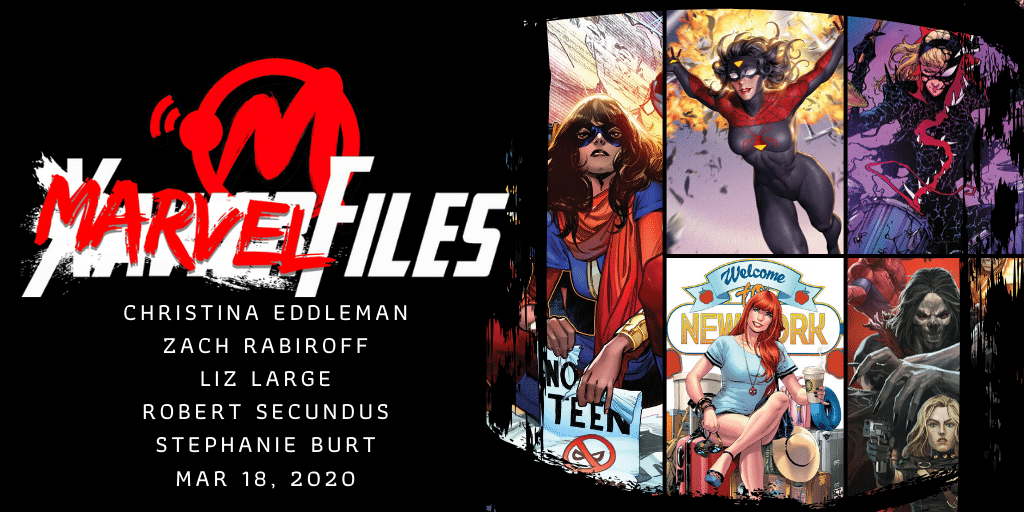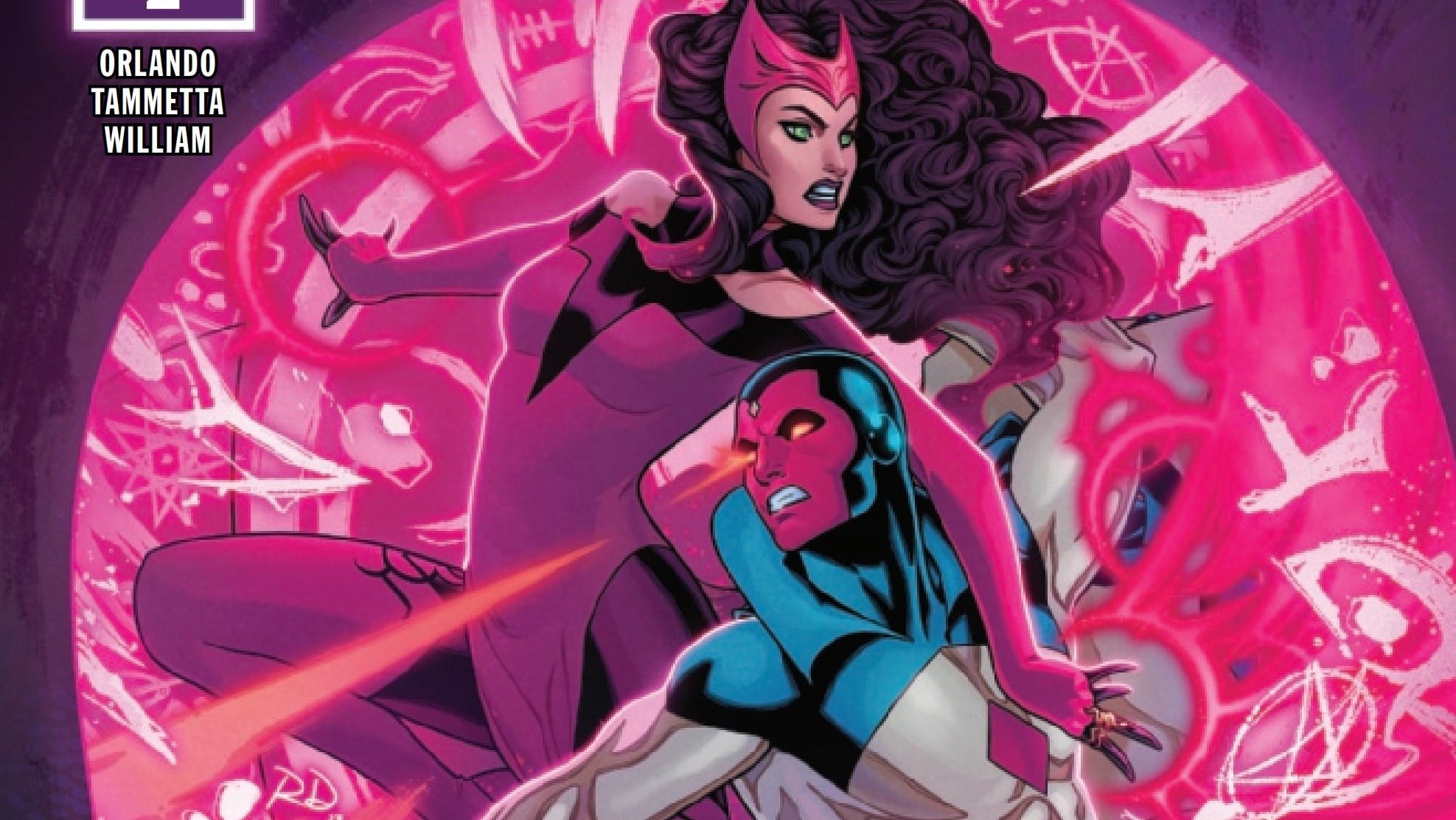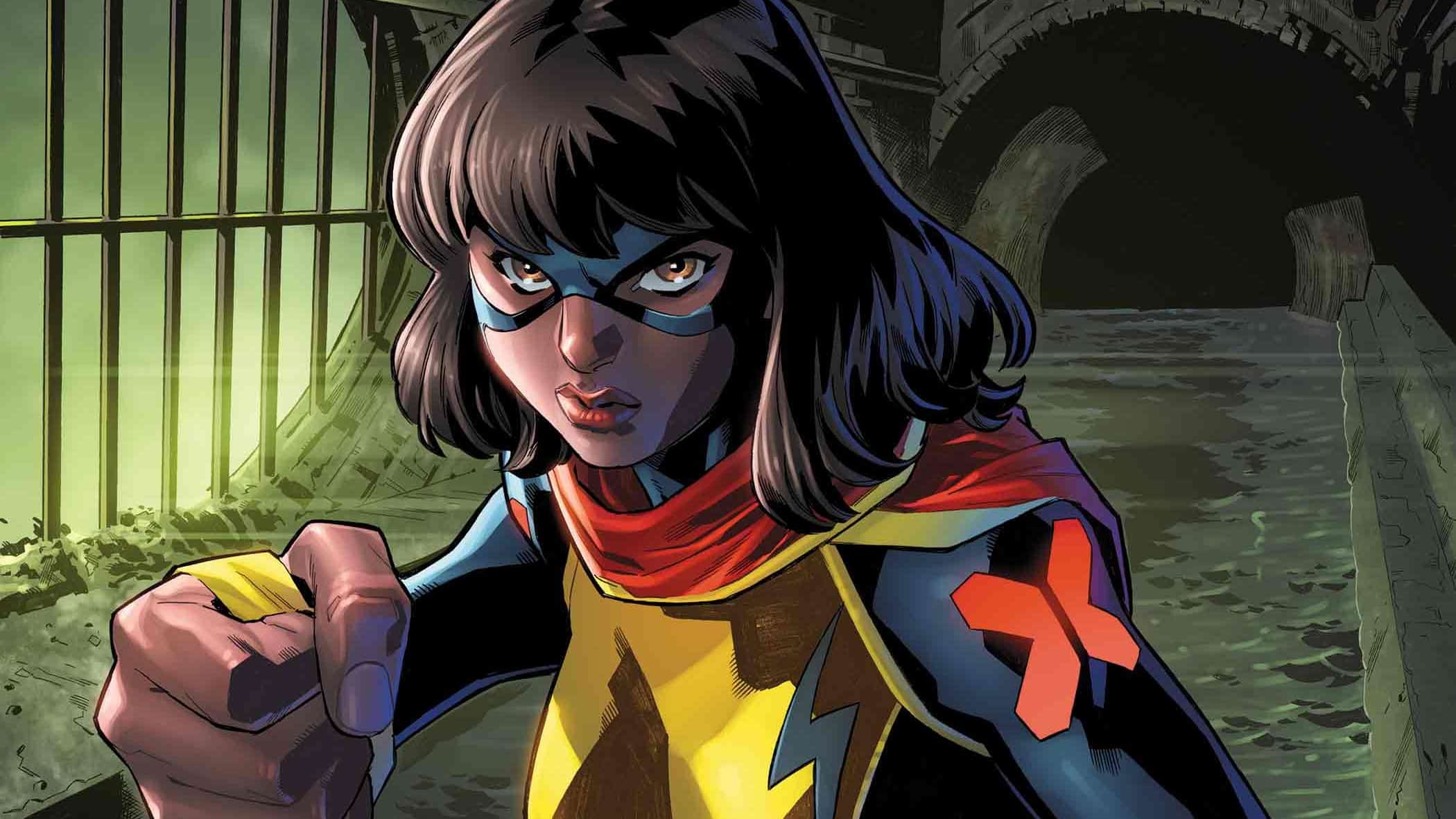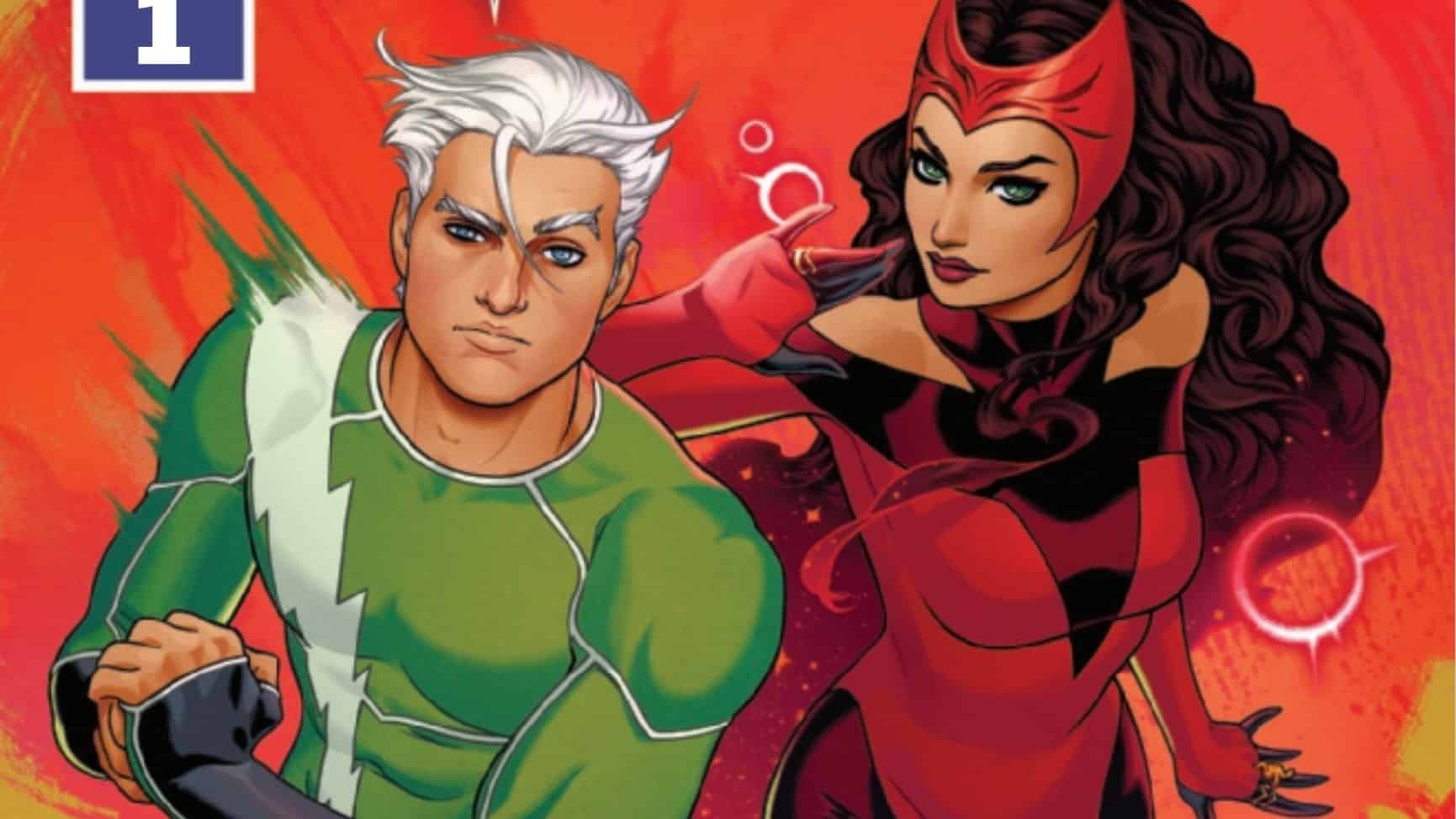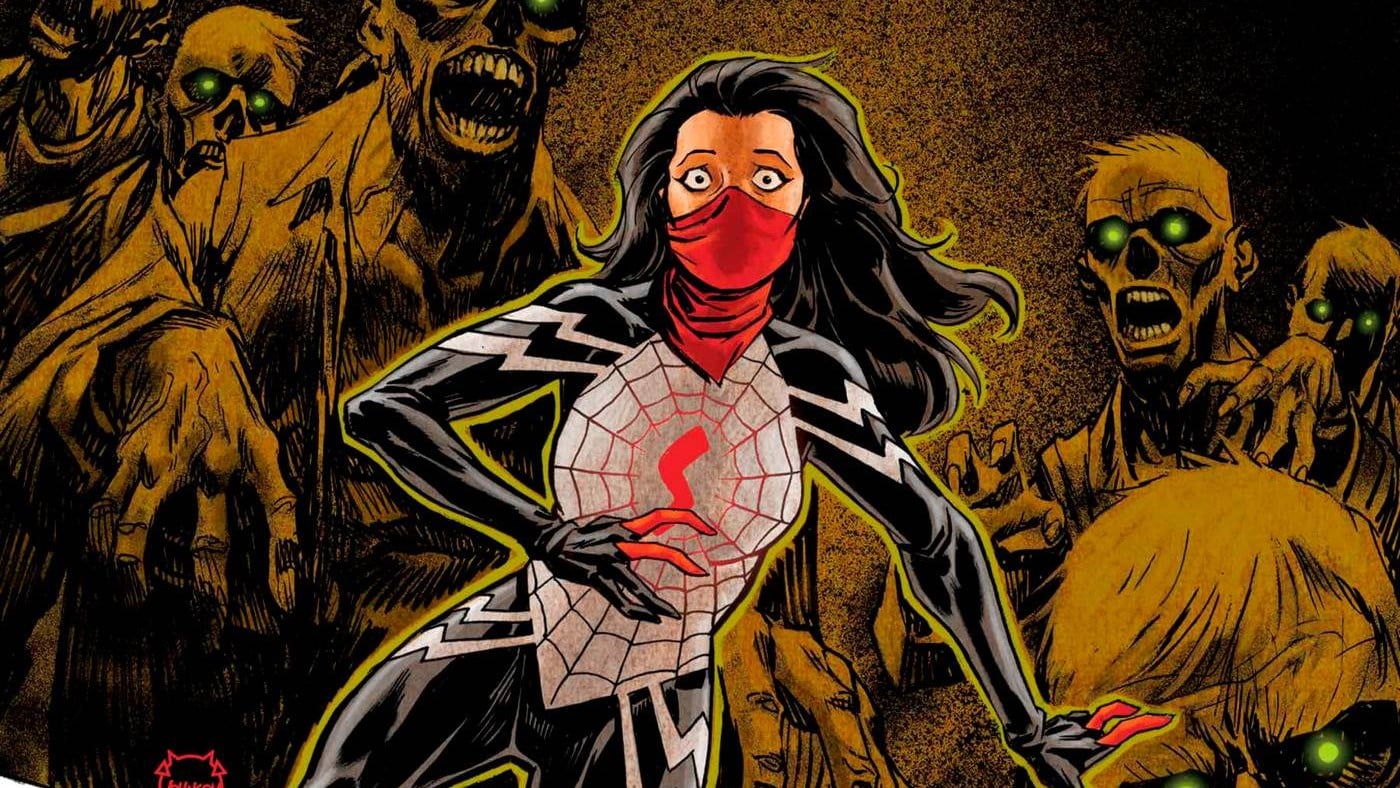Hello friends and readers, and welcome to the biggest Marvel Minutiae EVER. We really should be calling Marvel Max…in..utiae. Well anyway, Christina Eddleman is going to be giving her thoughts on the new Spider-Woman #1, Zach Rabiroff starts off with the new teen event with Outlawed #1. Liz Large makes her Minutiae debut with Amazing MJ #6, while chief of Gothic interest Rob Secundus gives us that vampire content with Morbius #5. Finally, it can’t be Minutiae without some spiders, so Stephanie Burt dives into Ghost-Spider #8. Enjoy this chocked-full week!
Spider-Woman #1
Fans of less popular superheroes are very particular about how their favs are written. They have to be. Wolverine can survive a rough run, but to those lesser known heroes, the kind only 10% of comic-con attendees recognize because they haven’t debuted in the MCU, a bad run can mean we don’t see them again in a solo title for years, if ever.
Pacheco, Perez, and D’Armata take a new approach to Jessica Drew while building upon established continuity. Much like the 2014-2017 Hallum and Rodriguez run, Jessica is attempting to live a “normal” life as a non-Avengers member. One thing she hasn’t really nailed down is a day job. Jessica grappling with the realities of capitalism [Ed. Note: A familiar problem for us all] is a bit on the nose as she’s contracted to protect a pharmaceutical executive’s daughter. I’m not sure how long I can be interested in Jessica Drew as a mercenary, so I’m hopeful we’ll see this plot evolve into something more complex.
The pacing of this issue definitely hammers home that Pacheco will be bringing us some action-packed Jessica Draw punctuated with the humor we’ve come to expect from a Spider-Woman title. The issue was rather combat-heavy, and most of the “meat” of the story was found in our two ending flashback sequences. I loved seeing that Roger and Gerry were still a part of Jessica’s life and Pacheco’s use of “Big Ronnie’s Custom Battle Spandex” (Unbelievable Gwenpool anyone?) was just plain fun. It’s in these moments we see that Pacheco has mastered Jessica’s voice.
Perez’s art coupled with D’Armata’s colors is functional, yet underwhelming, and the mysterious and perhaps evil black suit is a plot point that feels a bit too familiar. While the story has potential and interests me enough to keep reading, it is not as strong a first issue as I’d hoped.
Christi Eddleman is the world’s first Captain Kate Pryde cosplayer and co-host of Chrises On Infinite Earths.
Outlawed #1

Thirteen years ago, Marvel’s Civil War solidified the modern era of tentpole event crossovers [Ed. Note: For better or for much worse]. Rooted in the political zeitgeist of the late Bush administration, the series presented heroes with a stark choice between obedience to military authorities, or illegal pursuit of vigilante justice.
Readers of this week’s Outlawed by Eve Ewing and Kim Jacinto could be forgiven a certain sense of deja vu when thinking back to that earlier series. Starring the youthful Champions team, and meant to spearhead a new set of teen-focused titles, it sometimes feels a bit like the theater club at Marvel High putting on a production of their favorite grown-up crossover. As in the earlier story, the inciting incident is a teen superhero fight that turns into an unexpected tragedy. Here, too, the result is a series of government oversight measures that force the young heroes to choose between deference to their elders and life on the fringes of the law. It all begins to feel a bit too familiar for its own good.
Happily, this story has a couple of important legs up on its more famous predecessor. The first is its tight focus on the idealistic teen cast, rather than the Marvel Universe at large. Unlike the rank and file of superheroes, whose unsupervised vigilantism has always required a willful suspension of liberal values, the Champions have always been conceived as crusaders for social action as much as a traditional beat-’em’-up squad of junior Avengers. So the prospect of being reduced to tools of the status quo, rather than protesters against it, poses a more tangible existential threat.
It’s a theme ably explored by the issue’s second advantage, the formidable talents of writer Eve Ewing. Ewing previously proved in her work on Ironheart that she has both a keen ear for teen dialogue and characterization and a more than considerable knowledge of political and social issues, and she tackles the hot topics here with a level of thoughtfulness that would make Mark Millar blush. When Nova gives a speech to a Congressional subcommittee on the injustice of regulating teen heroes, it’s not the toothless boilerplate of comic book pseudo-politics, but rather an earnest attempt to make the Marvel Universe really resemble the world outside our windows. Kim Jacinto’s artwork is an equally strong fit, echoing the cartoonish, slightly grotesque look of Humberto Ramos (for both better and worse).
Yet as an attempt to bring the political relevance of Civil War into the modern era, Outlawed nevertheless falls short. Rather than push Marvel and its readers into new debates, Outlawed feels like a trip back to the arguments and issues of a decade ago. For all its impassioned dialogue, there is little here to suggest any of the new and vital issues of the post-Trump era: the spread of racism and xenophobia, the casual acceptance of violence both political and casual, the insidious creep of authoritarian politics. The comic is as informed and intelligent as could be asked, but its zeitgeist feels plucked from the wrong decade entirely.
There is enough style, substance, and promise of future setup here to make the issue more than just a missed opportunity. On its own, Outlawed is probably too thin and perfunctory a story to truly recommend. But as a setup for stories still to come, and as a showcase for what Ewing and Jacinto can do, it’s more than worth a look.
Zach Rabiroff works daily at a charity, and is also a freelance writer and editor. He reads a lot of comics.
The Amazing Mary Jane #6
As someone who reads almost exclusively X-Books, I didn’t know what to expect from Mary Jane #6, but it gave me everything I needed. This story starts off the new arc— filming is complete on MJ’s Mysterio movie, but that doesn’t mean the drama is going to end.
MJ’s talk show appearance had a great mix of colorful scenes—anyone who’s seen an actress do promotional appearances will find the Q&A believable— and twists and turns. MJ’s a hit with the host and the crowd, but is shocked when actual Cage McKnight shows up. Honestly, I love the idea of a douchey (can I say douchey?) director not realizing he’s being impersonated because he often does movies in “an artistic fugue” [Ed. Note: You sure can say “douchey”!].
But we fortunately don’t focus on this jerk too long, because as MJ and Cage are teaming up for a “random object bowling” game, MJ witnesses an offstage murder by a man in an Oni mask. We get to see her quick thinking here, as she manages to grab her shoes (but not her phone!), hit the alarm so the civilians will evacuate to safety, and make it out of the building and into a cab.
Throughout the issue, Williams gives us thought/narration boxes from MJ, and this sequence is when they shine. We get to see why she makes the choices she does, as she rehearses the conversation she’s planning to have with Peter. She’s putting herself at risk here by not calling for help or making a scene, but that’s because she knows the man is only going after witnesses—and if she’s the only witness, everyone else is safe.
We see Peter, who’s waiting at the restaurant while MJ finishes her tv appearance, runs from a murderer, and takes a speeding cab ride. It was nice to see the reversal of the typical Spidey scene here— for once, Peter is the one left waiting at a scheduled date while MJ’s career and subsequent adventure takes priority [Ed. Note: Take that, Spidey!].
And just when I expected the cab to deliver her to the restaurant, she’s at the police station to report the murder. Can I just say I am shocked to see a comic character report a murder to the police and not immediately be blamed for it! Is MJ the smartest human in the 616? Well, not exactly— she’s without her phone and doesn’t have Peter’s number memorized (realistic!). When the cops reveal that the man in the Oni mask is a known hitman and serious threat, MJ’s hustled off to the safety of Anaconda, Montana—without a chance to let Peter know.
I’m sure they have internet access in Anaconda, so MJ will be able to get in contact with somebody—but that means that the “unparalleled” hitman will be able to get in contact with her. And Peter? The last we see him, he’s trying to speak to MJ on the phone—but that’s not her on the other end. I’m interested to see where this goes!
Liz Large is a copywriter with a lot of opinions on mutants.
Morbius #5
Alisdair Macyntire famously begins After Virtue with an apocalyptic thought experiment: “Imagine that the natural sciences were to suffer the effects of a catastrophe.” Scientific knowledge is wiped out, but much, much later, humanity rediscovers old science articles and textbooks, and tries to make sense of them without understanding their foundations. People might be able to talk about neutrinos, but, he goes on to suggest, they wouldn’t really understand what they were talking about. He argues that this has actually happened in ethics. When we pick up Aristotle, we recognize the word “virtue” (or even ἀρετή, better translated as “excellence”), but we don’t share with Aristotle an understanding of what that word means.
I’m telling you this because I want to talk to you about the conclusion of the first arc of Morbius [Ed. Note: Is that the only reason, Mr. Graduate Student?], which begins with The Living Vampire taking a mad science serum that causes him to become some kind Super Saiyan Ultra-Vampire, and ends with him, Spider-Man, and a brooding vampire hunter from his past teaming up to fight and cure a small army of TMNT-esque mutant minions of The Melter. (If you haven’t read it, this sentence should be enough to convince you that it rules).
The arc also began with Morbius reflecting on his understanding of Aristotle: “What the philosopher was interested in was […] the Greatest Good […]. Brilliant as he was, it baffles the mind how he could have missed the obvious. The thing by which all other virtues are possible. Health. Life unencumbered by malady.” Morbius misreads Aristotle here, and not only because, like Macintyre suggests, he’s a man born of a modern, liberal, capitalist society that struggles to understand these ancient terms; no, this misreading tells us so much about who Morbius is and why he struggles. Of course he would see health as the greatest good; he’s defined by his own malady. Of course he would see health as a virtue; he blames his vices on his illness. Of course he would elevate something so individual to the highest good; he’s been isolated for so long. And of course he wouldn’t be able to make fine distinctions between things like material goods and virtues, which concern in Aristotle not the body but the soul (or we might say the mind). He’s a scientist, not a philosopher.
In reviewing #1, I’m reminded of a distinction made in the Nichomachean Ethics: “Practical wisdom is not scientific knowledge.” Earlier in that passage, Aristotle talks about how young men are often learned but rarely wise. They might know quite a bit about mathematics, but not so much about ethics. This is because prudence relies on experience. You have to actually go out and aim to do some good, fail, course correct in another direction, aim again, and shoot, over and over, until by practice you have learned to hit your mark.
We see in Morbius #5 that he’s learned quite a bit over the course of his arc. He returns to thinking about Aristotle: “I thought him a fool for not seeing what the Greatest Good was. But I was the fool for thinking I could so simply have the answer to such a complicated question.” He vows to continue working to better himself, to seek answers, and to “remember not to let myself become a monster.” He began this arc by misreading Aristotle; he’s now searching for practical wisdom, just as Aristotle would have it. He’s not going to take extreme action; that was what led him to becoming even more monstrous. He’s learned that virtues may be found in moderation between the extremes of vices. Most importantly, he’s no longer thinking only of himself. Morbius began the arc obsessed with only trying to cure himself, but now he’s curing others.
Later in After Virtue, Macintyre writes that “The self has to find its moral identity in and through its membership in communities.” Monsters may seek their own health, their own good; but human beings, if we are virtuous, if we are excellent, seek the good of each other.
Robert Secundus is an amateur-angelologist-for-hire.
Ghost-Spider #8

I’ve loved this run thanks to Gwen’s personality—determined, sometimes bubbly, sometimes angry, wisecracking (as you’d expect from a Spider-person), ready to carve her own path. I’ve very much loved (though it’s hardly new) the life-in-two-worlds motif: she’s going to university in the 616 and super-heroing on her home earth (Earth-65, or Earth-GS, depending on who’s lettering), and of course that means she can’t get enough sleep. Last issue (#7) added top-flight, Exiles-style world building: Johnny and Sue Storm are Kardashian-style online celebrities, amoral at best, malevolent at worst, back after years missing in Latveria, ready to jump-start their life of fame.
This fast-moving, middle-of-a-long-arc-style issue shows Gwen diving into more cross-universe research (can Gwen figure out if this Johnny and Storm are evil?) and more college angst. But it’s nearly overshadowed by the big and predictable conversation Gwen has with her prof on Earth-616, Original Flavor Peter Parker. That conversation is taking place in some form all over Earth-616 right now, because it’s the Outlawed line-wide event plot: superheroes under 21 can’t superhero without an adult. Civil War, but specific to minors. You know what that’s like if you’ve read, honestly, any superhero comics at all.
What you may not know if you haven’t been reading this series is just how good Ig Guara (line art) and Ian Herring (colors) can get. Everybody’s thin and stylized, true, but everybody is, also, expressive, even beautiful. That holds for Guara’s gymnastic, kinetic action scenes and, even more so, when Guara has to draw talking heads. Spider-Gwen has to run through a whole tumbler of emotions when she’s talking to 616 Peter, and Guara places all those emotions on Gwen’s photogenic face. (Would Guara have any interest in drawing New Mutants? Pleeeease?)
Though it’s hard to imagine—given the lead time on comics scripts—that McGuire intended as much, the era of social distancing makes the dimension-hopping aspect of Gwen even better. She’s been trying, and failing, to spend time on another Earth where things feel more normal, but her home world keeps butting in and breaking the fourth wall. As the now semi-outlawed superhero daughter of a non-terrible cop, she’s also well-positioned to think about how civilians (super- and otherwise) should step in where government fails. We could use more Spider-Gwens right now.
McGuire does what she can with the dialogue that the line-wide event requires. (Events, amirite?) Gwen connects the hundred-and-nineteenth government effort to register superheroes to her own responsibilities, her own faults, her own bravery—villains like the Jackal can now follow her from one Earth to the next, and that makes them her problem: “You own what you build,” Gwen says. “I built this.” Will she accept the 616 restrictions? No way: “You do what has to be done, because if you don’t, who will?”
Stephanie Burt is Professor of English at Harvard and the author of several books of poetry and literary criticism, most recently Don’t Read Poetry: A Book About How to Read Poems (Basic, 2019). Her nose still hurts from that thing with the gate.

